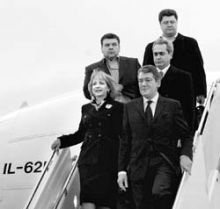Ukrainian President Viktor Yushchenko’s visit to the United States is, on the one hand, a revival of an old tradition, when both a new president’s term in office and a new political year in Ukraine began with a meeting with a US head of state. On the other hand, if this visit results only in the restoration of a normal relationship between the two countries, this alone may be considered a major breakthrough. After all, normal relations between Ukraine and the US ended in 2000. President George W. Bush never had an official meeting with the former Ukrainian president, which was not normal. President Yushchenko’s visit is highly symbolic, especially so his address to both houses of Congress. The declaration on strategic partnership to be signed in Washington as part of the visit has more to do with symbols rather than specific decisions and steps to resolve problem issues, of which there are many in the sphere of mutual trust (the Bush Administration was quite explicit about its lack of trust in the previous Ukrainian leadership) and mutual trade (Ukraine in fact remains under US sanctions: the Jackson-Vanik amendment, refusal to grant Ukraine market economy status, antidumping investigations, etc.). As for Ukraine’s professed goal of Euro-Atlantic integration, the USA and its European allies would like to get a clear picture of the current Ukrainian leadership’s plans in this respect, along with what it is doing to bring these plans to life, and the foreseeable consequences of this process. Meanwhile, any self-respecting Ukrainian leader on American soil should inquire about the findings of the investigation into the killing of Ukrainian journalist Taras Protsiuk, an investigation many Ukrainians not prone to Americanophobia consider a disgrace.
In the not so distant past, the thesis about the Ukrainian-American strategic partnership was repeated by the two sides even on the smallest of occasions. This repetition did not make the relationship genuinely strategic, since the ultimate goal of this partnership remained unvoiced, or altogether absent. At the same time, the US never concealed its profound interest in a truly strategic relationship with Poland in the Euro-Atlantic format, or cooperation with Russia on fighting international terrorism. In the early years of its independence Ukraine proved unable to take advantage of its unique geographic location, or prove its unique value for potential partners. Meanwhile, it turned into a country that invariably remained on the sidelines of international processes. The Ukrainian leadership lost a certain amount of time, during which it could learn the rules of this game and develop its own model of international participation that would reflect the national interests of Ukraine and not those of individual groups. There is no place among Ukraine’s priority interests for lukewarm relations with the world’s greatest powers, international isolation, or the absence of prospects for integration with the civilized world on the most favorable terms. It would be naive to believe that a single visit can help achieve radical breakthroughs. It would be equally naive to think that the US will recognize its own mistakes and miscalculations, of which there were also many. It’s a bad symptom that, for example, in the past few months the American press carried several publications, which hinted that the Bush Administration made a decisive contribution to the success of the Orange Revolution in Ukraine.
The Ukrainian-American relationship can and should become that of partners and allies. To this end, the two sides must come forward with a clear agenda that would rule out any scandals, such as the “tapegate” or the kolchuga affair, innuendos, or broken promises (such as the promise not to sell weapons to Macedonia). This agenda should perhaps envision constant contacts at all possible levels, and the concept of “small steps” would benefit both sides, if thousands of such steps were made in different sectors - from big politics to small businesses and Ukrainian-American exchanges between village schools. A new beginning, of which Ukraine’s Foreign Minister spoke in the interview with The Day, should in fact be new in terms of the philosophy and psychology of relations. It is not only Ukraine who should make efforts to maintain a proper international image and achieve maximum results. Both Ukraine and the United States face a complex situation, given the uncertainty of transatlantic relations, the lingering crisis of trust between the US and several European states, and the limited success of America’s democratization initiatives in Afghanistan, Kosovo, and especially in Iraq. The process of mending this relationship, which largely determines the context of Ukraine’s relations with the outside world, will not be simple. The conduct of the Ukrainian leadership will determine Ukraine’s place in this agenda and play a major role in convincing the American partners that strategic partnership cannot be unilateral with concessions from only one side.
Not so long ago, American trains were built using Ukrainians wheel sets, while the problem of CD knockoffs was no obstacle for Ukraine’s WTO accession. Such problems are difficult to overcome, and there is bound to be a certain amount of resistance from both sides. However, genuine partnership is not possible without removing trade barriers and creating normal conditions for business. Large-scale investments in the Ukrainian economy have prepared fertile soil for political and other contacts. But this also requires efforts from both sides, much like the problem of rocket fuel disposal, cooperation on the Odesa-Brody pipeline, and joint space projects. There may be more prospects than it would seem at first glance, especially considering that the US is now in a state of anticipation and “wary optimism.”
The meeting of the heads of state is a serious matter, and its results will be closely scrutinized both in Kyiv and Washington. It may turn over a new leaf in the bilateral relationship. On the other hand, things may yet again go no further than declarative rhetoric. Now is the time to take full advantage of the interest in Ukraine, as evidenced by Yushchenko’s speech in Congress, and get the most out of it.







